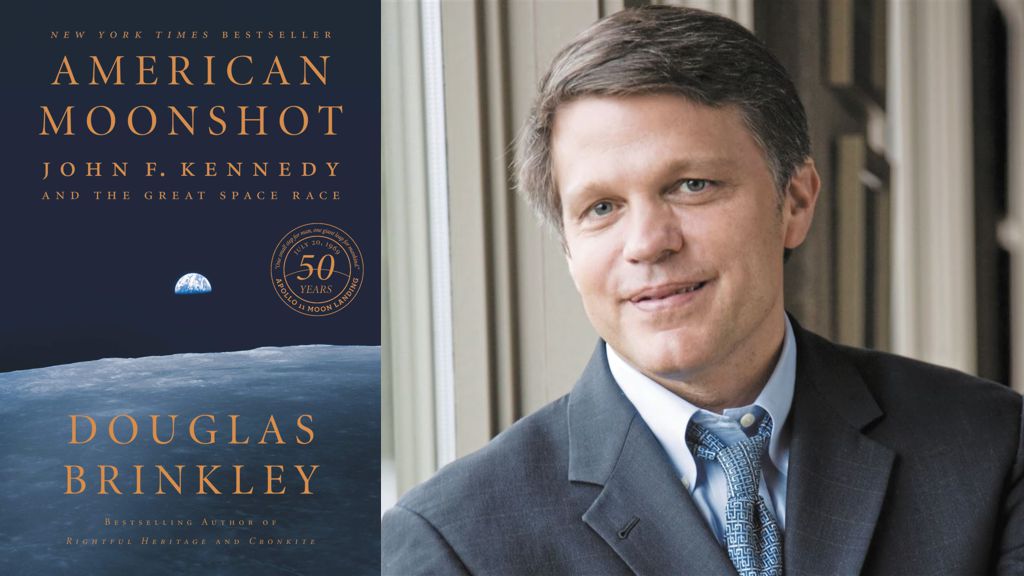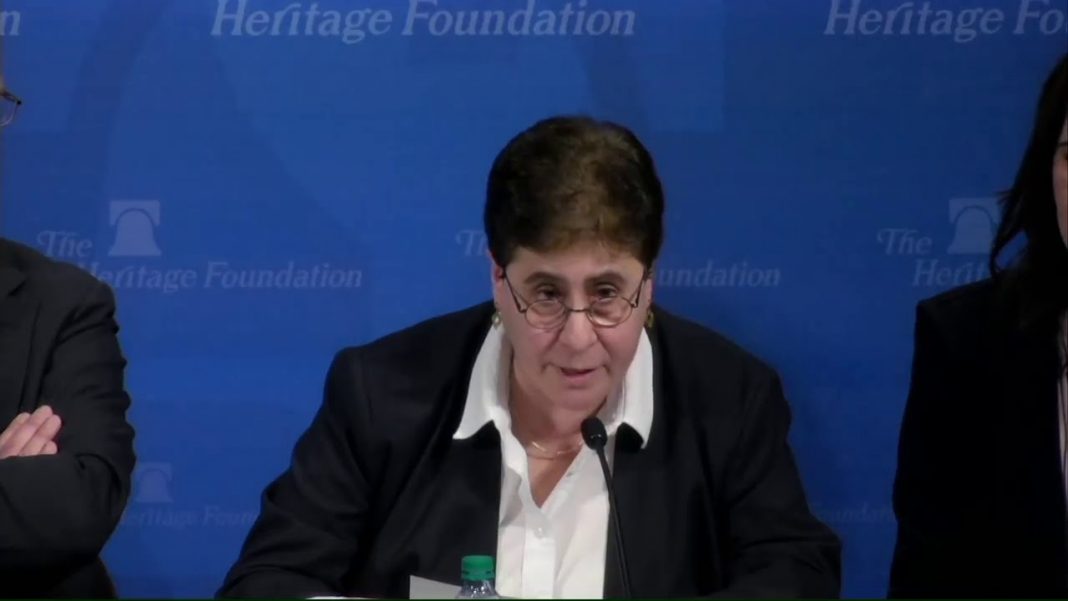
Instant New York Times Bestseller
As the fiftieth anniversary of the first lunar landing approaches, the award winning historian and perennial New York Times bestselling author, Douglas Brinkley takes a fresh look at the space program, President John F. Kennedy’s inspiring challenge, and America’s race to the moon in his book American Moonshot: John F. Kennedy and the Great Space Race.
“We choose to go to the Moon in this decade and do the other things, not because they are easy, but because they are hard; because that goal will serve to organize and measure the best of our energies and skills, because that challenge is one that we are willing to accept, one we are unwilling to postpone, and one we intend to win.”—President John F. Kennedy
On May 25, 1961, JFK made an astonishing announcement: his goal of putting a man on the moon by the end of the decade. In this engrossing, fast-paced epic, Douglas Brinkley returns to the 1960s to recreate one of the most exciting and ambitious achievements in the history of humankind. American Moonshot brings together the extraordinary political, cultural, and scientific factors that fueled the birth and development of NASA and the Mercury, Gemini and Apollo projects, which shot the United States to victory in the space race against the Soviet Union at the height of the Cold War.
Drawing on new primary source material and major interviews with many of the surviving figures who were key to America’s success, Brinkley brings this fascinating history to life as never before. American Moonshot is a portrait of the brilliant men and women who made this giant leap possible, the technology that enabled us to propel men beyond earth’s orbit to the moon and return them safely, and the geopolitical tensions that spurred Kennedy to commit himself fully to this audacious dream. Brinkley’s ensemble cast of New Frontier characters include rocketeer Wernher von Braun, astronaut John Glenn and space booster Lyndon Johnson.
A vivid and enthralling chronicle of one of the most thrilling, hopeful, and turbulent eras in the nation’s history, American Moonshot is an homage to scientific ingenuity, human curiosity, and the boundless American spirit.
Review
“Brinkley’s story is a gripping one…. Rice University scholar and an agile and prolific historian and biographer, Brinkley is well-situated to tell this story… Brinkley sees an important poignancy, and he renders it with real power.” (Boston Globe)
“A highly engaging history not just for space-race enthusiasts, but also students of Cold War politics….Prolific historian Brinkley avers that his latest is a contribution to “U.S. presidential history (not space studies).” However, in his customarily thorough way, it’s clear that he’s mastered a great deal of the fact and lore surrounding the Mercury, Gemini, and Apollo projects that landed American astronauts on the moon 50 years ago.” (Kirkus Reviews (starred review))
“At a time when national demoralization is so prevalent, Douglas Brinkley’s American Moonshot could not be more timely. His reconstruction of JFK’s bold commitment to space exploration and the heroic efforts of the men who made the “moonshot” a reality reminds us that America was and can be again a great principled nation that leads the world on to new frontiers.” (Robert Dallek, author of Franklin D. Roosevelt and An Unfinished Life: John F. Kennedy, 1917-1963)
“An epic narrative: it is the sweeping story of how humankind’s impetus for space exploration evolved from the early visionaries in Russia, Germany, and the United States at the dawn of the 20th century through the scientific and technological achievements–albeit associated human horrors–of two world wars….a particularly intimate and fascinating read.” (James R. Hansen, author of First Man: The Life of Neil A. Armstrong)
“Prepare to recall what it was like to be inspired and thrilled by American greatness. Doug Brinkley recounts, with deep research and exciting narrative, the bold spirit and faith in innovation that was embodied in Kennedy’s decision to launch a mission to the moon. His vision restored a vitality to America, something we could use today.” (Walter Isaacson, author of Leonardo da Vinci)
“The best new study of the American mission to space, rich in research and revelation.” (New York Times Book Review)
“Compelling and comprehensive….With a mixture of granular detail from a gigantic body of works on the subject and analyses of Kennedy’s decision-making and political savvy, American Moonshot transcends mere narrative to help the rest of us understand how America geared up for the astonishing feat of landing a man on the moon. With the approach of the 50th anniversary of Neil Armstrong’s ‘small step for man,’ Brinkley’s focus on the all-important early days provides a valuable perspective.” (Washington Post)
“In an age when so little seems possible, Douglas Brinkley has taken us back to a moment when everything did. In telling the riveting story of John Kennedy and the race to the Moon, Brinkley explores the complexities of politics, diplomacy, technology, and, perhaps most important, of human nature itself. This is a great book.” (Jon Meacham, author of The Soul of America: The Battle for Our Better Angels)
“Douglas Brinkley is not only a scholar, he’s a true storyteller. American Moonshot evokes and era, and brings to life the vivid personalities that accomplished one of the greatest feats in history.” (Lawrence Wright, author of God Save Texas: A Journey into the Soul of the Lone Star State)
“American Moonshot isa thoroughly terrific work which should reach the widest possible audience. As a study in leadership, it is absolutely first rate. As history, it is inspiring and enthralling. And to cap it all, it is a completely riveting story about the Space Age. I love this book.” (Doris Kearns Goodwin, author of the Pulitzer Prize-winning No Ordinary Time: Franklin and Eleanor Roosevelt: The Home Front During World War II)
From the Back Cover
On the fiftieth anniversary of the first lunar landing, acclaimed historian Douglas Brinkley takes a fresh look at the American space program, President John F. Kennedy’s inspiring challenge, and the race to the moon.
“Prepare to recall what it was like to be inspired and thrilled by American greatness. Doug Brinkley recounts, with deep research and exciting narrative, the bold spirit and faith in innovation embodied in John F. Kennedy’s decision to launch a mission to the moon. His vision restored a vitality to America, something we could use today.”—Walter Isaacson
Just months after being elected president of the United States, John F. Kennedy made an astonishing announcement to the nation: we would put a man on the moon by the end of the decade. In this engrossing epic of contemporary history, Douglas Brinkley returns to the 1960s to re-create one of humankind’s most exciting and ambitious achievements. American Moonshot brings together the extraordinary political, cultural, and scientific factors that fueled the birth and development of NASA and the Mercury, Gemini, and Apollo projects, which catapulted the United States to victory in the space race against the Soviet Union at the height of the Cold War.
Drawing on new primary source material and recent scholarship, Brinkley brings to life this fascinating history as no one has before. American Moonshot is a portrait of the brilliant men and women who made this giant leap possible, the technology that enabled them to propel men beyond Earth’s orbit to the moon and return them safely, and the geopolitical tensions that ignited Kennedy’s audacious dream. At the center of this story is Kennedy himself. As Brinkley shows, the president’s call to action was more than just soaring oratory—Kennedy was intimately involved in the creation of the space program, and he made it a top priority of his New Frontier agenda, fighting the tough political battles to make his vision a reality.
Featuring a cast of iconic and sometimes controversial figures, such as rocketeer Wernher von Braun, astronaut John Glenn, and space booster Lyndon Johnson, American Moonshot is a vivid, enthralling chronicle of one of the nation’s most thrilling, hopeful, and turbulent eras. This is living history at its finest—but also an homage to scientific ingenuity, engineering genius, human curiosity, and the boundless American spirit.
About the Author
Douglas Brinkley is the Katherine Tsanoff Brown Chair in Humanities and Professor of History at Rice University, a CNN Presidential Historian, and a contributing editor at Vanity Fair. In the world of public history, he serves on boards, at museums, at colleges, and for historical societies. The Chicago Tribune dubbed him “America’s New Past Master.” The New-York Historical Society has chosen Brinkley as its official U.S. Presidential Historian. His recent book Cronkite won the Sperber Prize, while The Great Deluge: Hurricane Katrina, New Orleans, and the Mississippi Gulf Coast received the Robert F. Kennedy Book Award. He was awarded a Grammy for Presidential Suite and is the recipient of seven honorary doctorates in American studies. His two-volume, annotated Nixon Tapes recently won the Arthur S. Link–Warren F. Kuehl Prize. He is a member of the Century Association, the Council on Foreign Relations, and the James Madison Council of the Library of Congress. He lives in Austin, Texas, with his wife and three children.
Biography
Dr. Douglas Brinkley is the Katherine Tsanoff Brown Chair in Humanities and Professor of History at Rice University, a CNN Presidential Historian, and a contributing editor at Vanity Fair. He has received seven honorary doctorates in American Studies. He works in many capacities in the world of public history, including for boards, museums, colleges and historical societies. Six of his books were named New York Times “Notable Books of the Year” and seven became New York Times bestsellers.
His The Great Deluge: Hurricane Katrina, New Orleans and the Mississippi Gulf Coast, 2007, received the Robert F. Kennedy Human Rights Book Award. He was personally selected by Nancy Reagan to edit President Ronald Reagan’s presidential diaries (2011). His 2012 book Cronkite won Fordham University’s Ann M. Sperber Prize for outstanding biographies. His two-volume annotated The Nixon Tapes, 2016, won the Arthur S. Link – Warren F. Kuehl Prize. He received a Grammy Award in 2017 as co-producer of Presidential Suite: Eight Variations on Freedom. The New-York Historical Society selected Brinkley in 2017 as their official U.S. Presidential Historian. He is on the Board of Trustees at Brevard College and the Franklin D. Roosevelt Presidential Library. He is a member of the Century Association, Council of Foreign Relations and James Madison Council of the Library of Congress.
He lives in Austin, Texas with his wife and three children.
Early Life and Education
Born on December 14, 1960 in Atlanta, Georgia. Brinkley’s mother, a high school English teacher, was a New Jersey native and his father, a Corning Glass Works executive, was from Pennsylvania. When Brinkley turned eight his family moved to Perrysburg, Ohio, As an undergraduate at The Ohio State University, he majored in U.S. history with a minor in Latin American studies, graduating with a B.A. in 1982. He published his first article in 1983 on the United Brotherhood of Carpenters and Joiners in America. In the summer of 1980 he spent a semester at Oxford University doing research on George Orwell. Accepting a fellowship to attend Georgetown University studying U.S. Diplomatic History, he earned his M.A. in 1983 and his PhD in 1989. During his student years he worked at used/antiquarian book stores including Second Story Books, Idle Times Books and the Phillip Collection.
Career
Brinkley’s early teaching career included teaching positions at the U.S. Naval Academy, Princeton, and Hofstra. While living in Annapolis he began researching the life and times of former Secretary of the Navy James Forrestal.. At Hofstra University he spearheaded the American Odyssey course (taking students on numerous cross-country treks where they visited historic sites and met cultural icons in including Arthur Miller, Toni Morrison, John Kenneth Galbraith, Jimmy Carter, Morris Dees, Ken Kesey, and William S. Burroughs). This class was written about in The New York Times and dozens of other newspapers. Elizabeth Gilbert (author of Eat, Pray, Love) wrote a ten-page profile about Brinkley in SPIN magazine after traveling around America with him on the natural-gas powered bus.
His 1993 book, The Majic Bus: An American Odyssey chronicled his first experience teaching this innovative on-the-road class, which became the progenitor to C-SPAN’s Yellow School Bus. The Associated Press noted that, “If you can’t tour the United States yourself, the next best thing is to go along with Douglas Brinkley aboard The Majic Bus.”
In 199x, Brinkley was appointed the Stephen E. Ambrose Professor of History and Director of the Eisenhower Center for American Studies at the University of New Orleans. During his tenure there he wrote two books with Ambrose: Rise to Globalism: American Foreign Policy Since 1938 (1998) and The Mississippi and the Making of a Nation: From the Louisiana Purchase to Today (2002).
In 2005 Brinkley was appointed Distinguished Professor of History and Director of the Roosevelt Center at Tulane University in New Orleans. Besides teaching classes on U.S. foreign policy he published important books on American culture. He edited Jack Kerouac’s diaries as Windblown World (2006) and Road Novels (2007). As literary executor of Hunter S. Thompson’s estate he edited two books of his letters Proud Highway (2012) and Fear and Loathing in America (2014). His work on civil rights includes writing Rosa Parks: A Life (2000) and his Preface for Congressman and civil rights leader John L. Lewis’ book Across the Bridge. Brinkley also wrote fourteen essays for American Heritage magazine from 1996 to 2012 on a wide-range of U.S. history topics such as Theodore Roosevelt’s love of nature, how Henry Ford’s Model T changed the world, Ronald Reagan’s small town Midwest beginnings, photographer Ansel Adams brilliantly capturing Alaska’s wilderness grandeur, and the story of unsung World War II boat builder Andrew Jackson Higgins. Click here to read the full articles.
Brinkley has also been actively involved in the environmental conservation and historic preservation community. Over the course of his conservation career, he has held board or leadership advisory roles in support of the American Museum of Natural History, Yellowstone Park Foundation, National Audubon Society and the Rockefeller-Roosevelt Conservation Roundtable. In 2015 he was awarded the Robin W. Winks Award for Enhancing Public Understanding of National Parks by the National Parks Conservation Association. In 2016 the U.S. Fish and Wildlife Service honored him with their annual Heritage Award.
Professional Accolades
Six of Dr. Brinkley’s books have been selected as The New York Times “Notable Books of the Year”: Dean Acheson: The Cold War Years (1992), Driven Patriot: The Life and Times of James Forrestal, with Townsend Hoopes (1992), The Unfinished Presidency: Jimmy Carter’s Journey Beyond the White House (1998), Wheels for the World: Henry Ford, His Company and a Century of Progress (2003), The Great Deluge: Hurricane Katrina, New Orleans, and the Mississippi Gulf Coast (2006), and The Wilderness Warrior: Theodore Roosevelt and the Crusade for America (2010).
Seven of his most recent publications have become New York Times best-sellers: The Reagan Diaries, (2007), The Great Deluge(2006), The Boys of Pointe du Hoc: Ronald Reagan, D-Day and the U.S. Army 2nd Ranger Battalion (2005), Tour of Duty: John Kerry and the Vietnam War (2004) Voices of Valor: D-Day: June 6, 1944 with Ronald J. Drez (2004), The Wilderness Warrior (2010), Cronkite (2012), and Rightful Heritage: Franklin D. Roosevelt and the Land of America (2016).
The Great Deluge (2006), was the recipient of the Robert F. Kennedy prize and a finalist for the Los Angeles Times Book award.
Brinkley won the Benjamin Franklin Award for The American Heritage History of the United States (1998) and the Theodore and Franklin Roosevelt Naval History Prize for Driven Patriot (1993). He was awarded the Business Week Book of the Year Award for Wheels for the World 2004) and was named 2004 Humanist of the Year by the Louisiana Endowment for the Humanities.
For his work as an Americanist he has received honorary doctorates from numerous institutions of higher learning including Nova Southeastern University (Fort Lauderdale, Florida); Trinity College (Hartford, Connecticut); Hofstra University (Hempstead, New York); University of Maine (Orno, Maine); St Edwards University (Austin, Texas); and Allegheny College (Allegheny, Pennsylvania). In 2002 Brinkley received Ohio State University’s Humanities Alumni Award of Distinction.
A side passion of Brinkley’s has long been jazz, folk, and rock ‘n roll music. He won a Grammy Award (Best Jazz Ensemble) in 2007 for co-producing “Presidential Suite: Eight Variations on Freedom” and was nominated for a Grammy for “Gonzo”, his collaboration with Johnny Depp on the soundtrack for an Alex Gibney documentary on Hunter S. Thompson. Other Brinkley music projects include writing the liner-notes for Chuck Berry’s last CD titled Chuck and producing Fandango at the Wall with Arturo O’Farrill.
Brinkley is also a member of the Council on Foreign Relations, Century Association, Society of American Historians, and James Madison Council of the Library of Congress. He is on the Board of Trustees at Brevard College and the Franklin D. Roosevelt Presidential Library. CNN recently honored Brinkley as “a man who knows more about the presidency than any human being alive.”





